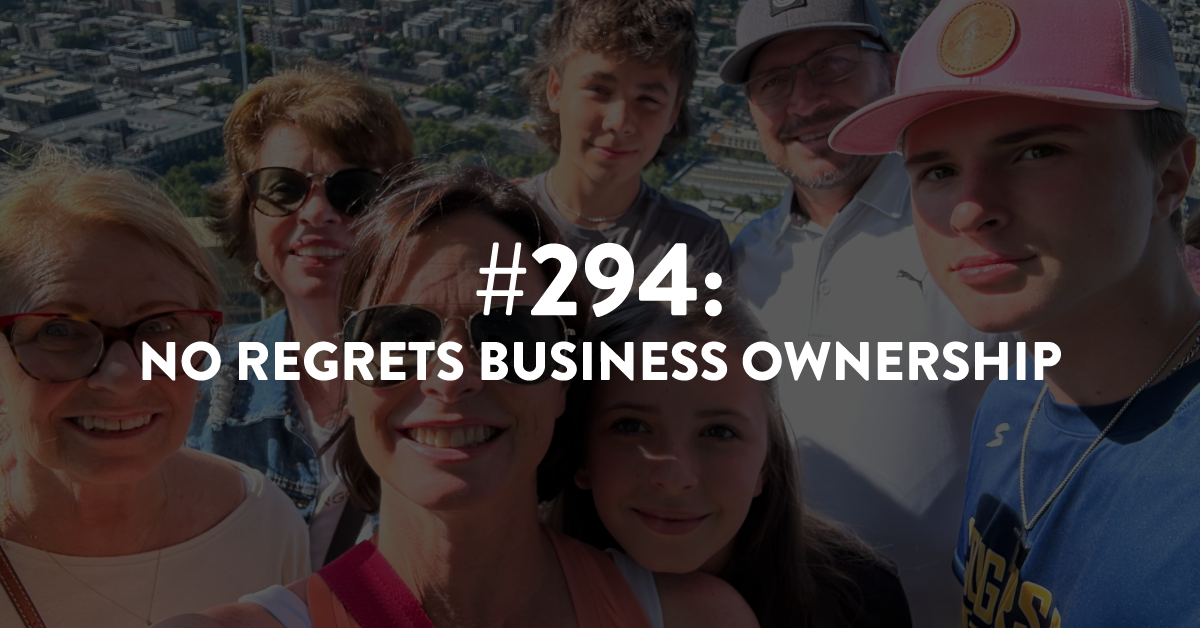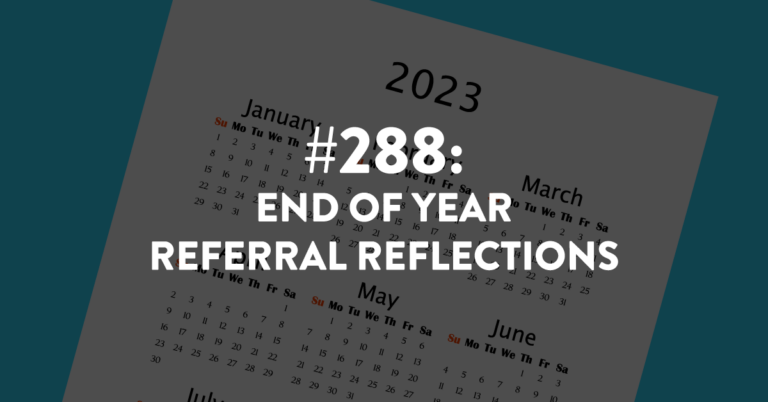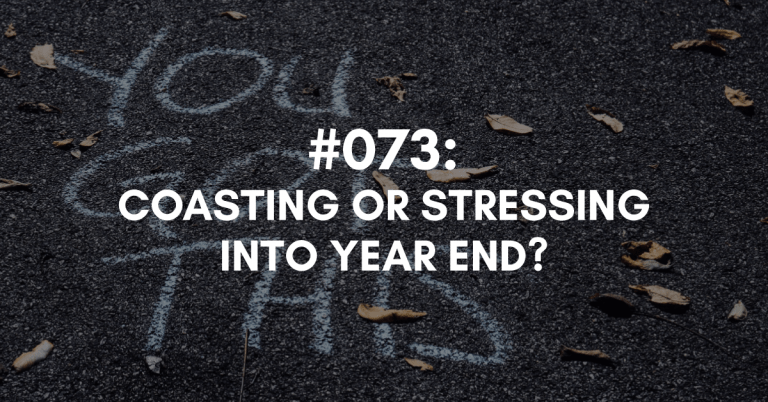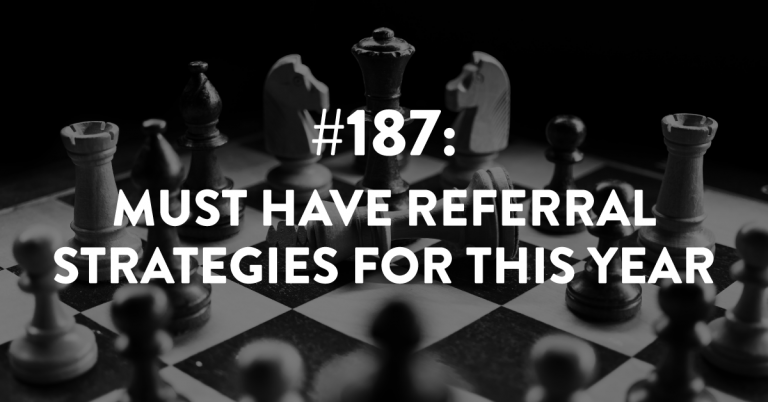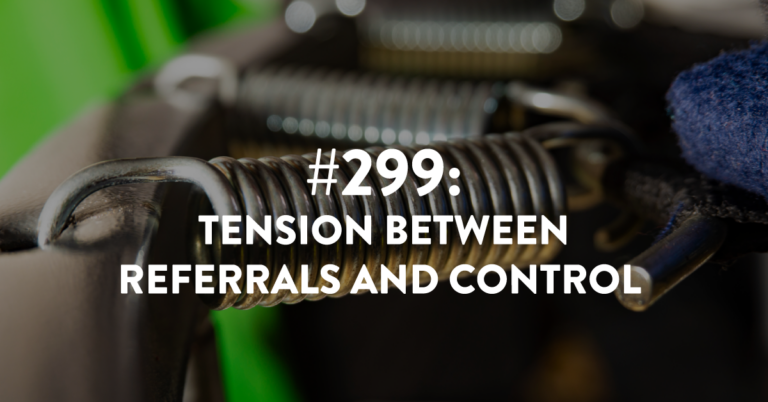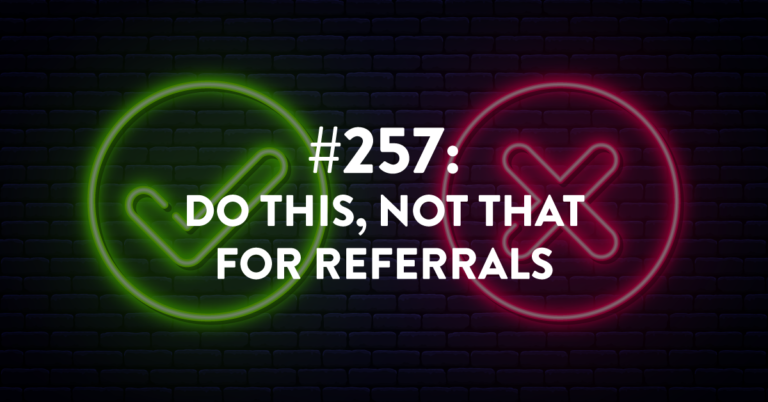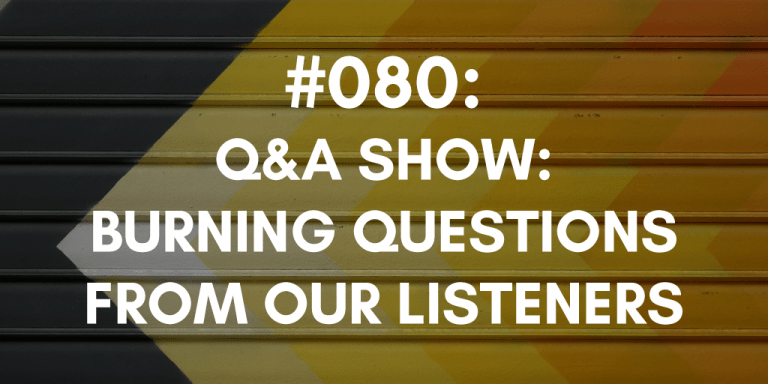Ep #294: No Regrets Business Ownership
Running a business without regrets requires an understanding of the metrics that matter. In this episode, I share how a documentary I watched in my early 20s has profoundly impacted how I run my business and make decisions.
This moment influenced my decision-making process and led me to prioritize certain aspects of my life over others. I believe in the importance of work-life balance and being present for my family, which means setting boundaries and being mindful of my working hours.
I also don’t chase a specific revenue number in my business but instead focus on profitability and ensuring that I can pay myself well, cover expenses, and have a healthy profit at the end of the year.
Additionally, I consistently ask myself, “If I do ‘this’, what will I regret?” This helps me make decisions that align with my values and priorities.
I encourage you to be intentional and make decisions that align with your values and priorities. By focusing on metrics that truly matter and considering potential regrets, you can build a fulfilling business that brings balance and personal growth to your life.
Links Mentioned During the Episode:
Learn how to work with me inside my Building a Referable Business™ coaching program. Check out the program and then apply to see if you’re a fit.
Next Episode:
Next episode is #295, which is another episode created with you and your needs in mind.
Download The Full Episode Transcript
Read the Transcript Below:
Stacey Brown Randall: People ask me from time to time how I came up with the model of how I run my business. It wasn’t easy and it certainly did not happen overnight, but it has served me well. And it’s also allowed me to run what I call a ‘No Regrets’ business. So here’s why I won’t regret how I run my business.
Hey there and welcome to episode 294 of the Roadmap to Referrals podcast, a show about helping you build a referable business. I’m your host, Stacey Brown Randall. My journey from a business failure to a successful business now 10 years in, I know generating referrals naturally and consistently has made all the difference. Working with clients around the world, we leverage the science of referrals, protect relationships above all else, and help you build a referable business.
Hey, so this is actually a re-recording of this episode. I’ve actually never really had to re-record an episode unless of course there was some technical issue like the file was corrupt or something didn’t save correctly, and I had to go back and record an episode.
And in the almost 300 episodes that I have done, I can’t ever remember going back and re-recording one for this particular reason. So I’m re-recording this episode because after I like, you know, recorded this episode with some of the other episodes this month and sent it off to my editor, there was something bothering me about this episode.
There was like this little like, something’s missing. And I was trying to figure out… what was missing and then when I figured out what was missing, I was like, do I rerecord or just let it go? Like, it’s already been shipped. Do I just rerecord, or do I let it go?
So I reached out to my editor, to Chris, and I was like, hey, have you started on episode 294? Because if not, I’d like to rerecord it. And she was like, sure. So this is our rerecording. And there’s a reason why.
And I want to tell you a story. And then, of course, the story informs so much more of what I want to talk about today in this episode, the ‘No Regrets Business Ownership’.
So let me start with a story, kind of give you a little backstory into the brain of Stacey, the mind of Stacey, the how I make decisions, and what kind of impacts me in that process of why I run my business the way that I run it, what metrics I chase, and which metrics I had to get to a point where I could let go of chasing and allow myself to build a business that really doesn’t leave me with any regrets.
That doesn’t mean things always work out the way I want them to. Let’s be clear. But I don’t regret doing certain things in my business because of the life that it affords me as well.
So I want to dive in because I think there are listeners of this podcast that I know you guys are here for the referral stuff. You’re business owners. Maybe you’re a solopreneur or a soloist like me, right? Or maybe you have a small team of just a handful of folks, and we need this more than sometimes others.
So I wanted to take a minute and I wanted you guys to hear this story and this journey of how I run my business and the metrics that I’m chasing that allow me to run that business. And one critical question I like to ask myself from time to time as I’m making decisions.
So here’s the story. Back in my early 20s, I can’t exactly remember when, I do know it was prior to being married. So this would have been somewhere between me graduating college at like 21 years old and moving to Charlotte and prior to getting married at 27.
When I think about, I think it was like really my early 20s that I watched a documentary. And I don’t know what show, I mean, what station this documentary is on. I couldn’t tell you who it was about. I couldn’t tell you names, but I do know it was a Silicon Valley CEO who had built this like massively amazing company.
Don’t remember the CEO’s name, don’t remember the company. I just know that it was a Silicon Valley documentary, like it was a Silicon Valley entrepreneur, like a documentary about how he grew this like powerhouse of some company, right? So for those of you who are like, oh, I wonder if I watched the same documentary. I don’t know, it was like in the early 2000s. That’s all I can tell you.
So I’m watching this documentary, and what’s really interesting is at the end, there is a short clip of an interview with this CEO and his son. And in this documentary, the son was probably teen years to early 20s. He was not young, as in a child. He was definitely probably, if I remember correctly, late high school or in college, or actually maybe even early 20s.
Some of these finer details are a little different. Like, I remember watching this documentary thinking, like, that’s almost an almost grown man, right? So he was definitely probably college age or early 20s.
And there’s a clip of the interview at the very end as they go through, like, all that this entrepreneur, right, the CEO had accomplished, and how he built his business, and why he built his business, and the luxury and the money that that afforded him in his business, and how he provided for his family, and what his life looked like.
And then there’s this clip with him interviewing his son, and he’s talking about the CEO, right, the dad, CEO, entrepreneur, is talking about everything he’s been able to provide to his family. And the thing that resonated the most with me is when the son speaks, and he said, “Why did you even have kids if you weren’t planning to be around?”
Oh! It was like a dagger to my heart for that dad. And at this point, you know, I’m like a young adult myself, like in my 20s, right? I remember thinking, this kid’s just a few years younger than me and he made this statement that just like, boom, like dropped, like mic drop.
It was like, and I’ve never forgotten it. I’ve never forgotten that comment. And that comment, that statement of like, ‘why did you have kids if you weren’t planning on being around?’ coming from a kid, and I was like, oh my gosh and that moment has stuck with me.
I remember they’re like sitting in chairs, it’s a white background as far as I remember they could have been in a room, like I just crystal clear remember that statement and I have carried it with me forever.
And it has informed almost everything about my life in terms of what I sought in a career. What I sought when I decided to start my first business, which then failed, and I had to start another one. What I was looking for, for my partner in life, right, that I was looking for and luckily found in Norm.
And how we build our family, how we make decisions about where we’ll spend our time and where we won’t spend our time, and what that looks like. And that doesn’t mean we haven’t gotten off course. And to be honest, this is at the core. This is one of those moments that is a trajectory changer, I think, for me. That’s just how I’ve always viewed it.
I think if maybe I hadn’t watched that documentary, a lot of things in my life may have been different, right? I remember watching that documentary, and I remember hearing them say, why did you have kids if you weren’t planning on being around? Like, yeah, you gave us all these things. You gave us all these nice things, but we didn’t have a father that was ever emotionally, mentally, physically available.
And as someone who wanted to be a mom at that point, and of course is now a mom, I just remember thinking, that’s just not the life I want. And if that means I can’t have billions, and I can’t have this huge company, and I can’t have a documentary done about me later in life, I’ll be okay. Like, that’s totally fine.
Because at that point, I was in my early 20s. I wasn’t married. I wasn’t having children. But I knew those things were things that I wanted, and that I was hopeful that was actually going to happen for me.
And so as I listened to that interview, it shifted a lot. I started looking around, like, who am I hanging out with? And what’s their drive in life? And who am I dating? Am I dating the guys that are on their way to make partner at the law firm, and they’re going to work 2,000, 3,000 billable hours in a year, and we’ll never see them?
Or the consultant that’s always traveling to another location to do an engagement? My best friend from college, she worked for one of the big four accounting firms after college. And she was always on some engagement in some other city somewhere else. And I just remember thinking, oh, that’s just not the life I want.
And so all of that kind of informed and shaped, I think, pivotal years, right? I think impressionable years of my 20s as I was trying to figure out what I wanted for my life.
Now, that didn’t mean I didn’t want to be successful. That didn’t mean I didn’t want to enjoy the business that I, either the career I was in or the business that I planned to one day start and grow. This has nothing to do with not wanting success. It has everything to do with how I define that success.
And so I think what’s hard about life today, and I think it’s been hard, is that we play this comparison game with others and how they’ve built their business and what their business looks like, or at least the shiny, bright, picture-perfect version of it that they show us on social media or that we see when they’re giving presentations or when they’re on some panel discussion.
People share the highlights always. But I’ve always been very, very crystal clear to pay attention to, I wonder what are the non-highlights. Right? What are the low moments they’re not showing? And what kind of impact has that had on themselves and their loved ones?
And in particular, in my case, my children. And so decisions were made. Intentional decisions were made. That doesn’t mean I didn’t sometimes find myself being like, ah, why am I not further along? Or why am I not more successful? Or why is my business not making more money?
But I did have this centering point. I did have this moment that I could always come back to. and be like, yes, you could make more money, Stacey. And you’re going to have to probably do A, B, and C.
I always find that when people are like, I need my business to be better, you probably know what you need to do. You’re just avoiding doing it. It’s usually what I have found, at least in my own case.
It’s like, yeah, you’re going to have to do that. You’re going to have to do that additional work, or you’re going to have to take that risk, or you’re going to have to put yourself out there in that way. And then it all comes down to, okay, well, am I going to do it? And then there’s a trade-off to all of those things.
And so I wanted to tell that story so that as you listen to how I ask questions of myself and how I structure my business, you have context. I think it’s really important you understand my mentality and my mindset as to how I make decisions about my business and about my life.
And that’s okay if yours don’t align with mine. But I don’t think you should listen to this episode the way I had recorded it the first time, about these things that I think about with a no regrets business ownership and why running a business with no regrets is so important to me without you having the context of something that deeply impacted me.
And to this day, now in my 40s, (just pretend I didn’t say that) I still think about, I still make decisions around. It is amazing how you can have moments like that in your life, and you probably have one.
You probably have a moment, maybe it’s in your childhood, maybe it’s in your young adult years, maybe it’s happened to you recently where you have this moment that everything shifts permanently moving forward. Or at least you have this moment that you come back to that, like, repositions you to what you’re actually after, right? I mean, we probably all have those moments.
If you have that moment, I would love to hear about it. Like, please direct message me on social media, comment on the post for this episode that you’ll see on social media, or just shoot me an email. I would love to know what that moment was for you that like everything shifted.
And there’s been other things, of course, in the last couple of decades that things have continued to shift and continue to refine what I want out of life. And then life has also happened to me. And so I’ve had to adjust. Right?
And I’ve had to sometimes pivot, and I’ve had to sometimes learn different things and be challenged in different ways because things have happened in life that I did not anticipate. And so that’s life, right? I mean, all those things happen. But I do think it’s recognizing that moment where you’re like, this changes everything. And that documentary did it for me. It was such a poignant moment.
And I think for me also, I also had parents that were always around. Like, my dad was a stay-at-home dad. He was my softball coach, my soccer coach, even though sometimes I wish he hadn’t been, right? He was there after school when I got home. He took me to horseback riding lessons.
Now, my dad was an author, and he was writing, but he worked from home. So he was a working-from-home, stay-at-home dad. But my mom was the breadwinner. My mom had a sales job and then she also worked weekends at her mother’s, my grandmother’s restaurant, which is of course the restaurant where my brother and I grew up working as well.
And so I was with her. She may have been working that second job at the restaurant, but I was right there beside her, probably getting told that I was not doing a good job by her. But I think that is something that you have to kind of understand.
The context matters when you listen to people talk about how they make decisions. And I just felt that this episode, without that story, was missing something critical to what I wanted to talk about in this episode.
And I think sometimes people are often surprised to learn that I’m not a million-dollar business. Now, maybe you’re not surprised to learn that now because of the story I just told you. And I did used to chase that number. I mean, I did used to.
Even when I had that moment from that documentary in the back of my head, when I was younger, I did chase the number. But I don’t now, and I haven’t for a very long time. I chase a different number. They are very different metrics. I’m just operating off of a different scorecard.
And I think a lot of us are operating off of a different scorecard. We just don’t admit it. And we still sometimes find ourselves taking our scorecard and comparing it to other people’s scorecard.
And it’s definitely been a journey to get to this different scorecard that I’m operating off of and that I’m comparing. And when I’m comparing myself to my own success or to me hitting what I want to hit in that scorecard, it’s the metrics that I’m chasing. They are typically different.
And it’s definitely been a journey to get here. Because the comparison game is hard. And it really will suck the life right out of you. And I have to remind myself, you’re running your own race. You want things to look different.
I am in a mastermind that has multi six figure and seven figure business owners in it. And I’ve been in this mastermind for over a year now. I don’t know if I’m in, I’m in my second year. I don’t think I’ve finished my second year. I can’t remember, but anyway, maybe I’m finishing out my second year.
But when they talk about strategies and tactics and things that they’re doing within their business and how they’re growing and what they’re looking at and what their metrics, I have to constantly remind myself, particularly when the seven-figure business owners are talking, that’s not my race. That’s not what I want.
My business isn’t even structured like theirs, let alone do I want that type of structure. I have to remind myself that. I can pull all the lessons out of it, but I have to remind myself of that. And it is because all of this that there is an intentional reason as to why my business is structured the way it is. It is why I operate chasing different metrics and operating off of a different scorecard.
And what has helped me as I am trying to be consistent with this scorecard and not get sucked into the comparison game of comparing myself and rating myself on somebody else’s scorecard, what has helped me is that I learned to ask myself this one important question. And so maybe this will help you as well.
The question I have learned to ask myself is, if I do this, what will I regret? So if I do this thing in my business, what will I regret? If I do this thing in my personal life, what will I regret?
Now, you may be thinking, that’s a terrible way to frame that question. But for me, what it means is that any time I say yes to something, I’m saying no to other things. So what are the no’s that will come out of this decision, and will I regret those? That’s how I frame and think about the different things I want to do in my business.
So when you think about what that means for me, it’s like, okay, and so let’s use the million dollar question or the million dollar example in asking this question. So if I chase a million dollars this year, there are certain things I’m going to have to say yes to, that I’m going to have to do.
The question to that is, there’s a lot of them things I’ll be saying no to. So what will I regret that ends up in the no category? And then it’s just a checks and balances. Then it’s just a weighing it out.
Like, which is more important? Are the regrets, hey, I can live with those regrets. Let’s go. I get it. I am not going to have these couple of things because I’m doing this thing over here that I’m saying yes to.
So an example as to when this played out where I picked the thing for business over all the things in the regret column was my book. When I wrote my book, Generating Business Referrals Without Asking, I spent a couple of weekends away from the family. I missed out on family things that happened.
I spent a lot of Sundays in a Starbucks during the editing process, missing out on family time. I was stressed about it. And it’s not just the writing of the book and then going through the editing process and then going through the publishing process, and then you got to market that puppy. Right? So that’s a long, long time. And there were things that I missed out on.
There were stressors that I brought into my world. There were things that I missed out on that I would have enjoyed doing. But the book tipped the scale to something I wanted.
So when I asked the question, hey, if I decide to write and publish my book, what will I regret? Well, the biggest question that came up was, I’ll regret if I don’t do it. And so that made the decision. So I did it.
Obviously, this was a conversation that Norm, my husband, and I had to have because of what it meant. And it’s a conversation I continually have as I piddle along with book number two. So that’s just kind of giving you an example of what it looks like.
But so for my business, I do chase different numbers. And I just want to hit some highlights there because maybe this will help you too. I don’t chase a yearly overall revenue number.
It’s funny. When I let go of chasing a revenue number, that’s when I actually started to hit it. Which is just really funny. But I didn’t chase an overall revenue number. I chase a profit number. I’d chase a profit number that I want in my business. At the end of the year, how much profit did my business make me?
So profit in my world, because I follow Profit First, book by Mike Michalowicz. What it looks like for me for profit is I have paid myself well, not like, you know, a thousand dollars a month. No, no, no. Like I pay myself well. My husband and I are a joint income family. We both need our paychecks to live the life that we have built for ourselves.
So I pay myself well. I’m able to pay my taxes and actually usually have more than I need in my tax account at the end of the year. But I pay my taxes. I can pay all the bills of the things or the expenses that are within my business. And this profit number is still there at the end of the year.
I think that’s important because that profit number informs all the things I get to do differently the next year. So whereas the revenue number, of course, equates to the profit number, when I focus on the revenue number, I focus on sometimes what isn’t showing up in the bank account.
When I focus on the profit number, It’s like watching it happen month after month as I take my profit and the business grows. I don’t know if I’m explaining that very well, but it is just a different mindset for me in terms of what am I watching.
If I am watching the revenue number like, oh, am I going to hit that number this year? There’s something that it does internally in my brain. I’m sure there’s lots of people out there who could probably explain this one to me. But when I’m chasing the profit number, when the scorecard includes the profit number, I don’t know, there’s like a release that happens for me as I watch that number happen.
And some years I hit it, folks, and some years I do not. 2023 was my best year in business. Funny, it’s my 10th year in business. It was my best year in business. Prior to that, 2021 had been my best year in business. Prior to that, I think 2019 had probably been my best year in business.
And so best year is, I guess, relative to the next time that you beat it. I don’t always have growth every single year. But I typically stay at a certain range, and then I have these growth trajectories that I work on, but I’m not chasing the revenue number. I’m chasing the profit that is available in my business for me on top of everything else that my business does in terms of paying myself, paying taxes, and paying all of my expenses.
I also chase a scorecard based on the number of hours I work. The less, the better. I’m just going to put that out there. If you come into one of my programs as a VIP or one of my coaching members in BRB, you’re not going to feel like I’m not available to you. In fact, you’re probably going to feel like, oh my gosh, she’s always available to me.
But I also know that that availability comes when it is needed, not every day. And so I can carve out a schedule that works for me, that allows me to have the freedom and flexibility that I ultimately want. So I chase the number of hours I’m working. And of course, I will say this again, the less the better.
Now, I’m not interested in only working like three hours a week in my business. I would be bored freaking silly. I don’t have any hobbies. I don’t have enough, I guess I should say hobbies. I would be organizing closets over and over and over again, if I only worked like four hours a week in my business. But I don’t want to work 40 hours either. So that’s what I look at, right?
And then the other thing I kind of pay attention from a scorecard is, how many baseball games did I make this week, this month, or this season versus though I missed for work? Now the reality of it is baseball games can be exchanged for something else for another child.
So when it’s my one of my sons it’s baseball. And if your kid plays, like my kid plays varsity baseball in high school, like if your kid plays and then they don’t just play in high school they typically are on some other additional team.
And if they’re on a travel team or showcase team I mean there’s just a crap ton of year-round baseball. Now, Jacob hasn’t always played year-round baseball, but a lot of years he has. And so baseball games for me is a good metric because it runs the full year.
But when I’m thinking about Mackenzie being in her, doing acting and being in shows, there’s a season for that based on when she’s in a play. And the question is, is how often am I taking her to those rehearsals? And am I making every performance? Usually, those performances are over a weekend, not like a full year of baseball games.
And then with my other son who plays basketball, it’s like, hey, am I missing these games? Am I able to make it to these games? So there’s a metric of what my kids are doing. And then the question is, based on what that is, is did I make the ones I wanted to make?
I will be honest with baseball, there’s a lot of baseball. I don’t have to make every single game. I’m going to just put that out there. So I think that’s important.
And then the other metric that I also use is how much gas was left in the tank in me internally when I stepped out of my office and into the home to be the wife and mom. That’s really important.
Most of you guys know my story if you’ve been a long-time listener of this podcast, then you know, eight years ago, it’ll be nine years this summer, we took custody of our nephew, my husband’s sister’s child. We took custody of our nephew and that changed a lot, and it continues to evolve, and it continues to like, just create, you know, learning moments for us as a family, as we grow year after year after year, and the kids have different stages in life.
And so sometimes when I step out of this house, I mean out of this house, I’m looking around my office. Sometimes when I step out of this office and into my home, if I’m walking in stressed or exhausted or tired, I kind of suck as a mom and a wife.
And so for me, it’s like, am I structuring my business, am I doing the things in my business that fills me with joy, and then I can step out and still be a nice, kind human because I’m not literally having the life sucked out of me, which has been the biggest decider for me in terms of how I’ve structured my business.
There were things that I recognized, and I’ve done episodes on this in the past, but there are things that I recognize that I was like, I have to stop doing this, because it’s exhausting me. It’s not what I want, ultimately. So I got to stop doing this.
And that’s been important in terms of how I’ve structured my business, going from a one-on-one coach into doing online courses. And that kind of sucks a different life out of you. And then moving into now what I have with the group coaching model, which is the done with you model, but then also offering the done for you model with a VIP.
But that’s even structured very particularly, so that my clients get what they need to be successful, and I also have the boundaries that I need to be able to protect my energy as much as protecting my time.
So are there times in the year where I walk into my house and I’m like spent because of work? Yes. And are there times of the year when I walk into the office, and I am spent because of my kids? Yes. That’s like life, right?
But overall, I don’t want to spend days, weeks, months, quarters at a time in that cycle of feeling spent walking out of work and into my home. I want to go in, and I want to be interested in what my kids have to say that day. I don’t want to be like, you know what, everybody just get on your phones at dinner tonight because mama doesn’t want to talk.
I don’t want to be that way, right? I want to be like, no, let’s have a conversation. Let’s talk to each other. Let’s watch a movie together. Let’s do whatever, right? So just something for you to kind of consider.
So as we end the first month of this brand new year, I want you to ask yourselves, what boundaries or what metrics are you chasing and why? And if you do chase those metrics, what will you regret? Pro or con? Run it out. Write it down. See what happens.
The one thing I know that my business provides to me that I love about how I run my business is I really do have that time flexibility. And I’m still able to make a really healthy living very successfully, too. And that’s really cool.
And every year brings new challenges. We’ll see what 2024 has on deck for me this year. I don’t know. We’ll see. We’ll see what’s out there. I know God’s universe has got me, so I’m not terribly worried.
But I also know that I have a baseline, a scorecard, different metrics, and I keep my eyes on those, and they allow me to run a business that doesn’t provide me with a ton of regrets, which I think is really, really important.
All right, the show notes page for this episode is StaceyBrownRandall.com/294. And we’re back with another great episode next week created with you and your needs in mind. Until then, you know what to do, my friend. Take control of your referrals and build a referable business. Bye for now.

